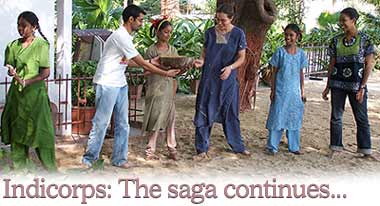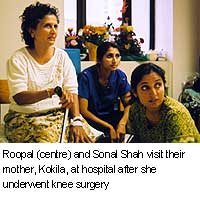Home > News > Specials
The Rediff Special/Arun Venugopal
December 18, 2003

Part I: Humanity that works
On the surface, the notion of doing social work in India is not new, and Sonal is the first to admit as much. There are thousands of non-profits and NGOs in India, performing a wide variety of services. However, Indicorps may be the first programme to directly solicit the services of young Indians living in North America, and that too after a competitive selection process.
For those who do apply to Indicorps, the organisation acts as mediator between the individual and the seemingly chaotic social sector of India.
Sonal, with her impressive background in the American development sector, lends cachet to the handful of programmes that Indicorps chooses to partner with. One of these is an agricultural water management project in Ludiya, in the Gujarati region of Kutch.
"It's dry land," she says. "Water runs off into the gutters. It has to be absorbed. So you put in large plants, you put in certain types of trees so the water is caught."
Rather than merely send in volunteers to perform the work, Indicorps Fellow Shezeen Suleman and the host organisation, known as Manav Sadhna, helped train locals to manage the programme themselves. "If they don't participate in it, it doesn't matter," says Sonal. "Maintenance is the issue."
Shezeen, a fourth generation East African whose family still speaks Gujarati, initiated what is known in development circles as an open contract process. This means that all bids for contracts are known to the public, whereas the standard practice in India has always been to keep it secretive.
"It had never been done," says Sonal. "But the community knows now what they should be getting with their money. Not half a well, not a quarter of a well, the whole well. The contractors weren't too happy about it."
But the idea caught fire in the region, and before long, other villages were seeing it as a solution to their mismanaged development works. "People were coming to Shezeen and saying 'Can you help us do this?'" says Sonal. "It's a pretty simple concept, but they didn't know about it. It's a process that gets passed on."
Another Fellow, Radhika Singh, worked elsewhere in Ludiya, on a handicraft cooperative, while Krishnan Unnikrishnan has been producing a musical with 1,400 street children in Mumbai. One of the most ambitious projects, perhaps, is a collaboration with Ekal Vidyalaya and the Friends of Tribals Society. The plan is to build, over the course of time, 100,000 schools in tribal areas.
While many of these projects, and for that matter, all development works, interact with sensitive constituencies, Indicorps has so far avoided any political controversy. For Sonal, it is vital the group avoids taking sides, whether it comes to religious politics or the communalism in Gujarat, where much of Indicorps' work takes place.
"I'm not interested in the ideology," she says. "We don't really want to get in that. A lot of things happen for ideological reasons."
The risk, she suggests, is that her young American or Canadian Fellows will charge in with grand ideas of the problems that plague a village when often the truth is complex or mundane or both.
"The politics aren't usually about religion. It's usually about land or something like that. Religion is used to create a greater disparity. In local communities, a lot of the disputes are usually over things that are more tangible, and it's important to understand that."
 She does, however, require that Indicorps Fellows be as informed as possible. To that end, she has prepared an Indicorps reader, which she is in the process of revising. As it currently stands, the Indicorps reader is a solid bit of reading -- three thick, photocopied volumes and just under a thousand pages of articles, novel excerpts and chapters from historical texts.
She does, however, require that Indicorps Fellows be as informed as possible. To that end, she has prepared an Indicorps reader, which she is in the process of revising. As it currently stands, the Indicorps reader is a solid bit of reading -- three thick, photocopied volumes and just under a thousand pages of articles, novel excerpts and chapters from historical texts.
The reader is ideologically diverse and includes the works of Amartya Sen, V S Naipaul, Salman Rushdie, Nehru, Mark Tully, and Shashi Tharoor, as well as Sunil Khilnani, Konrad Elst, Robert Kaplan, and Jeffrey Sachs. Asghar Ali Engineer is included, as is the pro-Hindutva French journalist Francois Gautier's Arise Again, O India and The Symbol of Ayodhya.
Rather than ignore any segment of the political continuum, Sonal has embraced all of them and encourages her Fellows to make their own, informed decisions.
"When I was in college, I took a history course, and my professor came in and he had this huge fight with his assistant."
The students, not knowing that they had witnessed a mock fight, were told to record what they had seen.
"There were 35 students in the class and they gave 35 different perspectives on what had happened. So it's the truth, but it's somebody's truth."
In a few years, Sonal says, she hopes Indicorps can sponsor 30 or 40 Fellows per year. The organisation is currently establishing a Senior Corps, which will allow older Fellows the chance to customise their own development projects. Indicorps is also working with other communities -- Iranian-Americans, Turkish-Americans, Bolivian-Americans -- who are interested in setting up their own organisations. Just as important is the fact that the Fellows are adequately supported when they return, through a well-established network and frequent opportunities to assume leadership positions.
"If the individuals are stronger then the work will be stronger."
What that work may be, she doesn't specify. She knows very well that many of her Fellows won't go on to careers in development. She seems confident, though, that the process will eventually lead to a richer Diaspora, one with a stronger connection to India and its hidden resources. Indicorps was never really about turning India around -- she
knows better than to overreach -- but she does think the development community as a whole needs to do a better job of quantifying the effects of its work in India.
"When you spend money on education, what happens? When the government spends three per cent on education, then five per cent, that's a success. But what does it mean?"
Sonal shifts back out of global development mode. Although much of her professional life has entailed looking at the big picture -- debt relief, $800 million packages and whatnot -- she seems to have concluded that ultimately, a few moments of contact can be the quickest route to progress.
"Half the time if you go to the slums it's more important if you sit down and have some tea than if you give them something," she says. "It goes a long way."
And then there are the villages in rural Gujarat and Maharashtra, where the locals make do with less, so that Indicorps Fellows can live more comfortably. "They would eat twice a day to feed us three times a day," says Sonal. "It was amazing. And you go, 'This is true India.' There's something about humanity that… that works."
Part I: Humanity that works